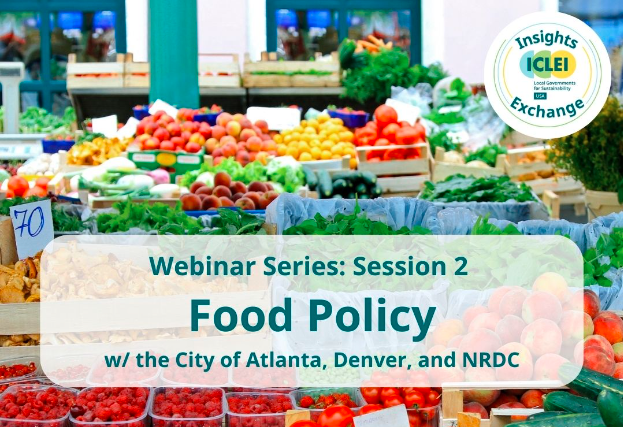Blog post
Linking Urban Food Policy and Circular Development
by ICLEI USA – Annika Jackson (Main), Intern; Anna Tiajoloff, Associate Communications Officer; and Angelica Greco, Program Officer
On November 22, ICLEI USA held the second episode of the webinar series Insights & Exchange: An Exploration of Urban Food Policy to showcase local government successes in food sustainability.
In the US, food policy and waste reduction are common entry points into conversations on circular economy and development. Speakers Laine Cidlowski (City of Denver, CO) and John Olu Baiyewu (City of Atlanta, GA) discussed their communities’ work on food security, policy, and justice; Andrea Collins (Natural Resources Defense Council, NRDC) spoke about NRDC’s research and advocacy around food waste reduction.
Laine Cidlowski, Environmental Administrator with Denver Public Health and Environment (DPHE), highlighted the city’s struggle with food insecurity and commitment to food justice. Around 30% of Denver residents are food insecure, a percentage that has nearly doubled since 2019. To reduce food insecurity, the city is transforming its policies, systems, and environments to better support food access. Denver’s Food Action Plan highlights the initiatives the city is implementing to achieve its 2030 goals. Many of these efforts touch on elements of the Circular City Actions Framework. For example, Denver has rethought programs that expand food access to focus on “complete, equitable food environments” that support local food sovereignty and inclusivity while also meeting neighborhoods’ food needs in ways that are both sustainable and culturally relevant.
Speaking about the City of Atlanta, John Olu Baiyewu, Atlanta’s Urban Agriculture Director, connected efforts to support food sovereignty with the city’s past. Atlanta has an extensive history of redlining, a discriminatory lending practice that denies applicants access to financing and loans based on race, ethnicity, or religion. Today, formerly redlined areas are more likely to be food deserts with high rates of food insecurity. AGLANTA, the initiative hosted by the City of Atlanta, the Mayor’s Office of Resilience, and the Department of City Planning, is working to improve food access through outreach and community-led initiatives. Baiyewu spoke about the intersectional nature of food, noting connections between food access and housing, transit, employment, education, and exposure to environmental stressors. Since 2007, Atlanta has implemented a number of policies to help alleviate food insecurity in the city, including, most recently, a 2021 City Farm Stand Ordinance to allow on-site sales of urban-grown produce. These efforts have many benefits, not just for health and wellbeing, but also for the growth of local, low-impact circular economies.
Andrea Collins, a food sustainability specialist with NRDC, spoke about that organization’s work on tools, methodologies, and policies that cities can adopt to reduce food waste. NRDC’s suite of “Food Matters” tools can help cities understand sources of food waste, how much food is wasted, and what the food rescue potential is for different industry sectors within their boundaries.
Though cities do not always tie these efforts explicitly to the circular economy, the links are clear. In the U.S., millions of people are food-insecure. At the same time, 40% of edible food is wasted and the agricultural industry is responsible for about 11% of US GHG emissions. Current linear food systems are substantial contributors to the climate crisis while simultaneously failing to meet the needs of many. Adopting circular food policies can help cities simultaneously address many overlapping challenges, including food insecurity, carbon emissions, and inequities.


